宾语从句与表语从句.
宾语从句和表语从句
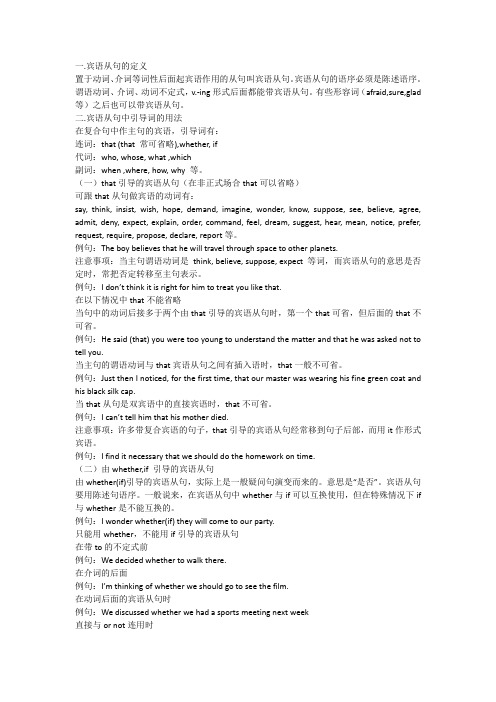
一.宾语从句的定义置于动词、介词等词性后面起宾语作用的从句叫宾语从句。
宾语从句的语序必须是陈述语序。
谓语动词、介词、动词不定式,v.-ing形式后面都能带宾语从句。
有些形容词(afraid,sure,glad 等)之后也可以带宾语从句。
二.宾语从句中引导词的用法在复合句中作主句的宾语,引导词有:连词:that (that 常可省略),whether, if代词:who, whose, what ,which副词:when ,where, how, why 等。
(一)that引导的宾语从句(在非正式场合that可以省略)可跟that从句做宾语的动词有:say, think, insist, wish, hope, demand, imagine, wonder, know, suppose, see, believe, agree, admit, deny, expect, explain, order, command, feel, dream, suggest, hear, mean, notice, prefer, request, require, propose, declare, report等。
例句:The boy believes that he will travel through space to other planets.注意事项:当主句谓语动词是think, believe, suppose, expect 等词,而宾语从句的意思是否定时,常把否定转移至主句表示。
例句:I don’t think it is right for him to treat you like that.在以下情况中that不能省略当句中的动词后接多于两个由that引导的宾语从句时,第一个that可省,但后面的that不可省。
例句:He said (that) you were too young to understand the matter and that he was asked not to tell you.当主句的谓语动词与that宾语从句之间有插入语时,that一般不可省。
宾语从句和表语从句要点归纳
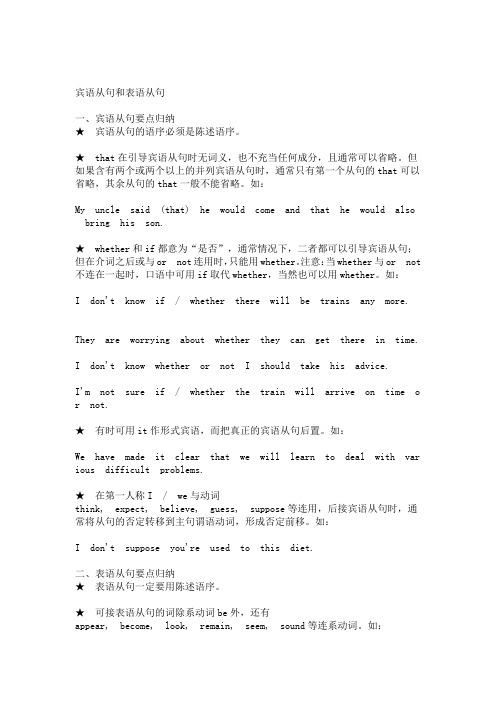
宾语从句和表语从句一、宾语从句要点归纳★宾语从句的语序必须是陈述语序。
★that在引导宾语从句时无词义,也不充当任何成分,且通常可以省略。
但如果含有两个或两个以上的并列宾语从句时,通常只有第一个从句的that可以省略,其余从句的that一般不能省略。
如:My uncle said (that) he would come and that he would also bring his son.★whether和if都意为“是否”,通常情况下,二者都可以引导宾语从句;但在介词之后或与or not连用时,只能用whether。
注意:当whether与or not 不连在一起时,口语中可用if取代whether,当然也可以用whether。
如:I don't know if / whether there will be trains any more. They are worrying about whether they can get there in time.I don't know whether or not I should take his advice.I'm not sure if / whether the train will arrive on time o r not.★有时可用it作形式宾语,而把真正的宾语从句后置。
如:We have made it clear that we will learn to deal with var ious difficult problems.★在第一人称I / we与动词think, expect, believe, guess, suppose等连用,后接宾语从句时,通常将从句的否定转移到主句谓语动词,形成否定前移。
如:I don't suppose you're used to this diet.二、表语从句要点归纳★表语从句一定要用陈述语序。
宾语从句和表语从句

This/That is because...
2.表语从句中whether 表示是否时不能用if 替代。
Bye-bye
宾语从句的语序
陈述句语述——
主语+谓语+宾语+其他
宾语从句的时 态由句意决定
一般过去时
过去时态 表示客观真理时用一般现在时
否定前移
主句谓语动词是
think,believe,suppose,expect 宾语从句的意思为否定时,否定词前移到主句。
eg.我认为他不会成功。
宾语从句的位置
动词和介词之后
引导词 连词:that,whether,if 代词:which, who,what,whose whichever,whoever,whatever 副词:when,where, why,how(however) that 无意义只起连接作用 固定用法:1.but that;except that 2.用it作形式宾语的宾语从句,与that 搭配。 eg.We think it very important that every student should study hard at English .
I think (that)he will not (won't) succeed.× I don't think (that)he will succeed.√
doubt 接宾语从句的用法
eg.I doubt whether/if he will keep his word.
I don't doubt that he will keep his word. Do you doubt that he will keep his word? 当主句是肯定式时,用whether/if 引导宾语从句 当主句是否定或者疑问式时,用that引导。
高中英语知识点归纳宾语从句与表语从句的区别
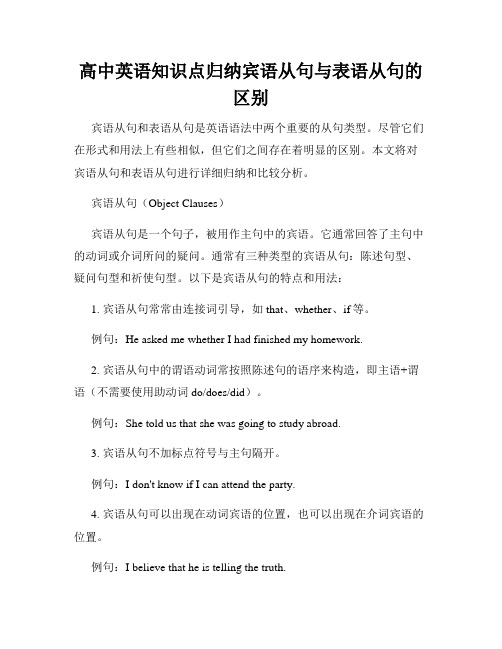
高中英语知识点归纳宾语从句与表语从句的区别宾语从句和表语从句是英语语法中两个重要的从句类型。
尽管它们在形式和用法上有些相似,但它们之间存在着明显的区别。
本文将对宾语从句和表语从句进行详细归纳和比较分析。
宾语从句(Object Clauses)宾语从句是一个句子,被用作主句中的宾语。
它通常回答了主句中的动词或介词所问的疑问。
通常有三种类型的宾语从句:陈述句型、疑问句型和祈使句型。
以下是宾语从句的特点和用法:1. 宾语从句常常由连接词引导,如that、whether、if等。
例句:He asked me whether I had finished my homework.2. 宾语从句中的谓语动词常按照陈述句的语序来构造,即主语+谓语(不需要使用助动词do/does/did)。
例句:She told us that she was going to study abroad.3. 宾语从句不加标点符号与主句隔开。
例句:I don't know if I can attend the party.4. 宾语从句可以出现在动词宾语的位置,也可以出现在介词宾语的位置。
例句:I believe that he is telling the truth.They are discussing whether to go on a trip.表语从句(Predicate Nomination Clauses)表语从句用来说明主语的身份、状态、特点等,并与系动词(如be、seem、appear等)连用,充当系动词的宾语。
以下是表语从句的特点和用法:1. 表语从句通常由连接词引导,如that、whether等。
例句:His dream is that he becomes a successful businessman.2. 表语从句中的谓语动词与主从句的主语保持一致。
例句:The problem is that we have run out of time.3. 表语从句不加标点符号与主句隔开。
宾语从句和表语从句详解
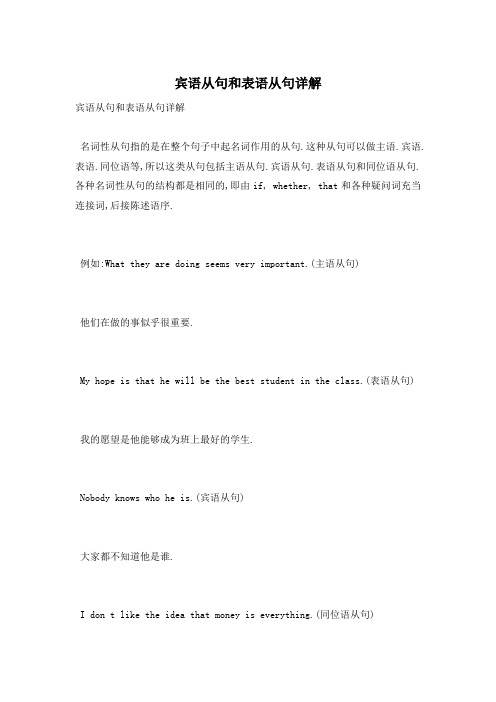
宾语从句和表语从句详解宾语从句和表语从句详解名词性从句指的是在整个句子中起名词作用的从句.这种从句可以做主语.宾语.表语.同位语等,所以这类从句包括主语从句.宾语从句.表语从句和同位语从句.各种名词性从句的结构都是相同的,即由if, whether, that和各种疑问词充当连接词,后接陈述语序.例如:What they are doing seems very important.(主语从句)他们在做的事似乎很重要.My hope is that he will be the best student in the class.(表语从句)我的愿望是他能够成为班上最好的学生.Nobody knows who he is.(宾语从句)大家都不知道他是谁.I don t like the idea that money is everything.(同位语从句)我不喜欢金钱就是一切这一观点.引导名词性从句的连接词中,除了that,if和whether之外其它的都作从句中的一个成分.【宾语从句】在句子中作动词或介词宾语的从句叫做宾语从句.引导宾语从句的词有连词that, whether, if;连接代词who, which, what以及其强调形式 whoever, whichever, whatever; 连接副词 when, where, why, how等.例如:Do you know where the Greens live?I have no interest in how rich he is.宾语从句主要用于下面五种结构:1.由that引导的宾语从句(that 引导宾语从句时,特别是在口语中可省略)The boy believes that he will travel through space to other planets.that引导的宾语从句多用于say, think, insist, wish, hope, demand, imagine, wonder, know, suppose, see, believe, agree, admit, deny, e_pect, e_plain, order, command, feel, dream, suggest, hear, mean, notice, prefer, request, require, propose, declare, report等后.当主句谓语动词是 think, believe, suppose, e_pect 等词,而宾语从句的意思是否定时,常把否定转移至主句表示.例如:I don t think it is right for him to treat you like that.(= I think it is not right for him .)that不能省略的情况:(1)当句中的动词后接多于两个由that引导的宾语从句时,第一个that可省,但后面的that不可省.如:He said (that) you were too young to understand the matter and that he was asked notto tell you.(2)当主句的谓语动词与that宾语从句之间有插入语时,that一般不可省.如:Just then I noticed, for the first time, that our master was wearing his fine greencoat and his black silk cap.(3)当that从句是双宾语中的直接宾语时,that不可省.如:I can t tell him that his mother died.2.由特殊疑问词引导的宾语从句这样的宾语从句实际上是由特殊疑问句变化而来的,宾语从句要用陈述句语序.用于这种结构的动词常常是:see, say, tell, ask, answer, know, decide, show, find out, imagine, suggest, doubt, wonder, discover, understand, inform, advise等.I can t decide which book I should buy.3.由whether(if)引导的宾语从句I wonder whether(if) they will come to our party.由whether(if)引导的宾语从句,实际上是一般疑问句演变而来的.意思是是否 .宾语从句要用陈述句语序.一般说来,在宾语从句中whether与if可以互换使用.4.宾语从句后带有宾补时,需用it作形式宾语,而把宾语从句放在句后,这时that不省略.例如:He thought it wrong that they left the child alone at home.【表语从句】在句子中作表语的从句叫做表语从句.引导表语从句的词有连词that,whether;连接代词who,what,which;连接副词when,where,how,why以及其它连词as if,as though,because等.例如:The question is whether it is worth reading.They are just what I want.That s why they were late.1.含有表语从句的复合句中的主语通常是fact,truth,e_planation,problem,opinion,view等.如:The fact is that fish can t go without water.事实是鱼离开水不能存活.2. as if (as though)也可以用于表语从句.但多是以下面形式出现.主语+look(seem)as if+从句如:It looked as if it was going to snow.It seems as if there will be a quarrel soon.注意:不用 if 引导表语从句.reason做主语时,表语从句应由that引导,不用because. that 引导表语从句时,通常不能省略.专项练习(附答案)1. I flew to New York for the talk show on TV last week. Is that ______you had a few days off?A. whyB. whenC. whatD. where2. I ask her _____ come with me.A. if she willB. if will sheC. whether will sheD. will she3. It was a matter of _______ would take the position.A. whoB. whoeverC. whomD. whomever4. Can you tell me ________?A. who is that gentleman isB. that gentleman is whoC. who that gentleman isD. whom is that gentleman5. Can you tell me ________ the railway station?A. how I can get toB. what can I get toC. where I can got toD. where can I get to6. It is generally considered unwise to give a child ________ he or she wants.A. howeverB. whateverC. whicheverD. whenever7. Do you know ________ ?A. what is his nameB. how is his nameC. what his name isD. how his name is8. Go and get your coat. It s________ you left it.A. thereB. whereC. there whereD. where there9. I wonder how much ________.A. does the watch costB. did the watch costC. the watch costedD. the watch costs_. It was _____ he said _____ disappointed me.A. what;thatB. that;thatC. what;whatD. that;what_. Is Mary from New York City? I don t know _______.A. from what city does she come fromB. from what city she comeC. what city does she come fromD. what city she comes from_. Henry killed the dog. I ll ask him why ________.A. did he do thatB. he did thatC. he didD. he has done so_. Have you seen Henry lately? My boss wants to know ________.A. how he is getting alongB. how is he getting alongC. what he is getting alongD. what is he getting along_. I am sure ________ he said is true.A. thatB. about thatC. of thatD. that what_. You can t imagine ________ when they received these nice Christmas presents.A. how they were e_citedB. how e_cited they wereC. how e_cited were theyD. they were how e_cited_. Why the e_plosion occurred was ________ the laboratory attendant had been careless.A. forB. becauseC. sinceD. that_. We gave him ________ help we could.A. whichB. whatC. thatD. this_. E_cuse me would you please tell me ________?A. when the sports meet is taken placeB. when is the sports meet going to be heldC. when is the sports meet to beginD. when the sports meet is to take place_. This book will show you ________ can be used in other conte_ts.A. how you have observedB. how what you have observedC. that you have observedD. how that you have observed_. Where do you think ________?A. has he goneB. has he beenC. he s goneD. was he参考答案:1. A 由句子结构得知,空白处应选能在表语从句中作状语的连接副词,A. B. D.三个答案均能满足这一要求,但根据句意应选A,why为连接副词,在表语从句中作原因状语.2. A 宾语从句作ask的直接宾语,应用陈述句语序.3. A 空白处在宾语从句中做主语,因而可首先排除C.D两项.whoever = anyonewho与题意不符,故答案为A.4. C 宾语从句应用陈述句语序. 你能告诉我那位绅士是谁吗?5. A 问路应该说How can I get to ,宾语从句应用陈述句语序,故选A.6. B 空白处为want 的宾语,应选用连接代词,而whichever常用作定语,whatever = anything that,故答案为B.7. C 8. B 9. D_. A what he said在复合句中做主语,that是强调句用法._. D _. B _. A_. D 在作表语的形容词后的宾语从句中的that不可省略._. B 这是一个由how引导的宾语从句,在宾语从句中要用陈述句语序,故答案为B._. D 表语从句中的that不可省略. _. B _. D _. B _. C。
宾语从句与表语从句
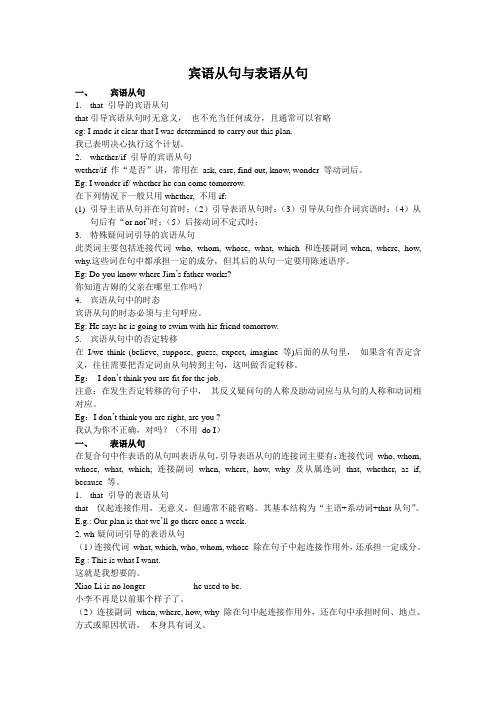
宾语从句与表语从句一、宾语从句1.that 引导的宾语从句that引导宾语从句时无意义,也不充当任何成分,且通常可以省略eg: I made it clear that I was determined to carry out this plan.我已表明决心执行这个计划。
2.whether/if 引导的宾语从句wether/if 作“是否”讲,常用在ask, care, find out, know, wonder 等动词后。
Eg: I wonder if/ whether he can come tomorrow.在下列情况下一般只用whether, 不用if:(1)引导主语从句并在句首时;(2)引导表语从句时;(3)引导从句作介词宾语时;(4)从句后有“or not”时;(5)后接动词不定式时;3.特殊疑问词引导的宾语从句此类词主要包括连接代词who, whom, whose, what, which 和连接副词when, where, how, why.这些词在句中都承担一定的成分,但其后的从句一定要用陈述语序。
Eg: Do you know where Jim’s father works?你知道吉姆的父亲在哪里工作吗?4.宾语从句中的时态宾语从句的时态必须与主句呼应。
Eg: He says he is going to swim with his friend tomorrow.5.宾语从句中的否定转移在I/we think (believe, suppose, guess, expect, imagine 等)后面的从句里,如果含有否定含义,往往需要把否定词由从句转到主句,这叫做否定转移。
Eg:I don’t think you are fit for the job.注意:在发生否定转移的句子中,其反义疑问句的人称及助动词应与从句的人称和动词相对应。
Eg:I don’t think you are right, are you ?我认为你不正确,对吗?(不用do I)一、表语从句在复合句中作表语的从句叫表语从句,引导表语从句的连接词主要有:连接代词who, whom, whose, what, which; 连接副词when, where, how, why 及从属连词that, whether, as if, because 等。
宾语从句和表语从句的区别和联系
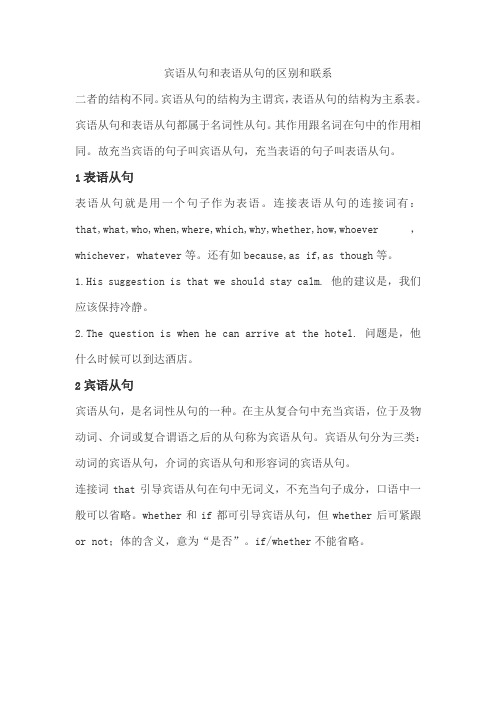
宾语从句和表语从句的区别和联系
二者的结构不同。
宾语从句的结构为主谓宾,表语从句的结构为主系表。
宾语从句和表语从句都属于名词性从句。
其作用跟名词在句中的作用相同。
故充当宾语的句子叫宾语从句,充当表语的句子叫表语从句。
1表语从句
表语从句就是用一个句子作为表语。
连接表语从句的连接词有:that,what,who,when,where,which,why,whether,how,whoever,whichever,whatever等。
还有如because,as if,as though等。
1.His suggestion is that we should stay calm. 他的建议是,我们应该保持冷静。
2.The question is when he can arrive at the hotel. 问题是,他什么时候可以到达酒店。
2宾语从句
宾语从句,是名词性从句的一种。
在主从复合句中充当宾语,位于及物动词、介词或复合谓语之后的从句称为宾语从句。
宾语从句分为三类:动词的宾语从句,介词的宾语从句和形容词的宾语从句。
连接词that引导宾语从句在句中无词义,不充当句子成分,口语中一般可以省略。
whether和if都可引导宾语从句,但whether后可紧跟or not;体的含义,意为“是否”。
if/whether不能省略。
宾语从句与表语从句
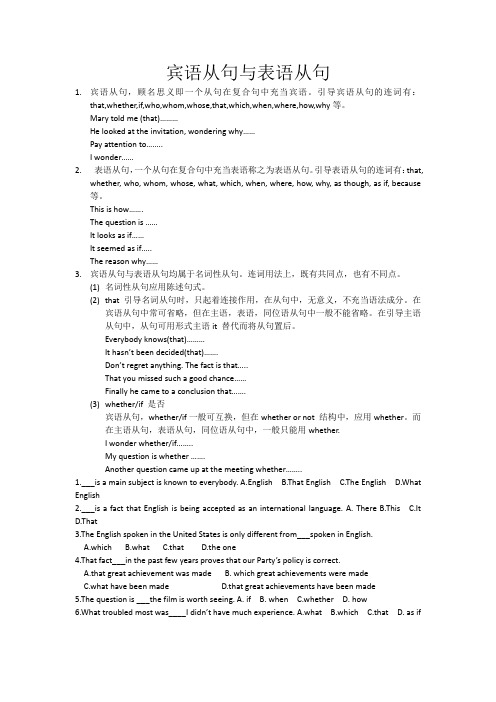
宾语从句与表语从句1.宾语从句,顾名思义即一个从句在复合句中充当宾语。
引导宾语从句的连词有:that,whether,if,who,whom,whose,that,which,when,where,how,why等。
Mary told me (that)………He looked at the invitation, wondering why……Pay attention to……..I wonder……2.表语从句,一个从句在复合句中充当表语称之为表语从句。
引导表语从句的连词有:that,whether, who, whom, whose, what, which, when, where, how, why, as though, as if, because 等。
This is how…….The question is ……It looks as if……It seemed as if…..The reason why……3.宾语从句与表语从句均属于名词性从句。
连词用法上,既有共同点,也有不同点。
(1)名词性从句应用陈述句式。
(2)that 引导名词从句时,只起着连接作用,在从句中,无意义,不充当语法成分。
在宾语从句中常可省略,但在主语,表语,同位语从句中一般不能省略。
在引导主语从句中,从句可用形式主语it 替代而将从句置后。
Everybody knows(that)………It hasn’t been decided(that)…….Don’t regret anything. The fact is that…..That you missed such a good chance……Finally he came to a conclusion that…….(3)whether/if 是否宾语从句,whether/if一般可互换,但在whether or not 结构中,应用whether。
- 1、下载文档前请自行甄别文档内容的完整性,平台不提供额外的编辑、内容补充、找答案等附加服务。
- 2、"仅部分预览"的文档,不可在线预览部分如存在完整性等问题,可反馈申请退款(可完整预览的文档不适用该条件!)。
- 3、如文档侵犯您的权益,请联系客服反馈,我们会尽快为您处理(人工客服工作时间:9:00-18:30)。
【本讲教育信息】一. 教学内容:名词性从句——宾语从句与表语从句二. 知识精讲在复合句中起名词性作用的句子叫名词性从句。
名词性从句的功能相当于名词词组, 它在复合句中能担任主语、宾语、表语、同位语、介词宾语等,根据它在句中不同的语法功能,因此名词从句又分为主语从句、宾语从句、表语从句和同位语从句。
(一)宾语从句1. 概念及引导词在复合句中起宾语作用的从句叫宾语从句。
引导宾语从句的连接词有连接代词(who, whom, whose , what , which, whoever , whatever, whichever )、连接副词(when , where , how, why )及从属连词(that , whether, if ).例:John said (that)he was leaving for London on Wednesday.约翰说他星期三要到伦敦去。
I am glad that you are satisfied with your job.你对工作满意我感到很高兴。
She will name him whatever she wants to.她高兴给他起什么名字就起什么名字。
That depends on where we shall go.那取决于我们去哪儿。
2. 宾语从句的种类常见的宾语从句有动词的宾语从句、介词的宾语从句和形容词的宾语从句三种。
(1)动词的宾语从句They know that the habit may kill them.定语从句他们知道这个习惯会害死他们。
They doubt whether or not Jack is a good student.他们怀疑Jack是否是一个好学生。
They wanted to see which shops offered the best advice and service定语从句.他们想了解哪家店提出的建议和提供的服务最好。
(2)介词的宾语从句一般情况下介词后只能接wh- 类连接词引导的宾语从句,但but, except, besides等后可接that引导的宾语从句。
We are talking about what we’ll do next.我们正在讨论下一步做什么。
I know nothing about him except that he lives here.对于他,我只知道他住在这儿,其他一无所知。
他和他的同学们不同的地方在于他把业余时间用在读书上了。
(3)形容词的宾语从句sure, certain , pleased , happy , afraid , surprised, sorry 等表示情感的形容词后可接宾语从句。
I’m not sure whether they will agree to such a plan.我不确定他们是否同意这样一个计划。
I’ m afraid that you have been given the wrong address.恐怕给你的地址不对。
3. 宾语从句应注意的问题。
(1)宾语从句中whether和if可互换,但作介词宾语或句中有or not时,用whether.I am not sure whether /if he will come.=I am not sure whether he will come or not .我拿不准他是否会来这儿。
It depends on whether you can do the work wel l.这取决于你能否把工作做好。
(2)it 作形式宾语在宾语从句中,it通常作形式宾语,而把真正的宾语放到句末。
这种用法通常有两种情况:①find, consider, think, feel , believe , make 等动词后有宾语补足语时,常用it作形式宾语,而将真正的宾语后置。
I have made it clear that I will not accept the job.我已表明我不会接受这份工作。
He feels it his duty that he should serve the people heart and soul.他觉得全心全意为人民服务是他的职责。
②有些动词或短语如enjoy, love , like , hate, appreciate , take , see to , insist on , depend / rely on 等接宾语从句时,习惯上在从句前加形式宾语it。
You may depend on it(形式宾语) that I shall always help you.你可以信赖的是我会一直帮助你。
I would appreciate it if you could give me a hand.如果你能帮我一把,我会很感激(你的)。
I hate it when people ask me for money.我不喜欢别人向我借钱。
(3)否定前置在由I / We think (consider, suppose(猜想) , believe , expect , guess, imagine)等引导的从句里,如果含有否定含义,往往把否定词由从句转移到主句,构成否定前置。
I don’t(否定前置)think he can finish the work on time.我认为他无法按时完成工作。
I don’t suppose he cares, does he?我想他不在意,是吗?(4)宾语从句的语序宾语从句中的语序要用陈述语序。
They couldn’t understand why I turned down his invitation.他们不理解我为什么拒绝了他的邀请。
He asked what was the matter with my computer.他问我电脑出什么故障了。
(5)宾语从句的时态如果主句中的谓语动词是现在时态,从句中的谓语动词不受主句谓语动词时态的影响,可以根据需要使用任何时态。
如果主句的时态是过去时态,从句一般应与主句的时态保持一致,但从句表示的是真理或客观事实时,从句的时态要用一般现在时态。
He says he is going to swim with his friend tomorrow.他说他打算明天和朋友去游泳。
The teacher asked the students what they were doing.老师问学生们在干什么。
Our teacher told us that light travels faster than sound.老师告诉我们光比声音传播得快。
(6)宾语从句中that的省略在that引导的宾语从句中,that无任何意义,不充当任何成分,常省略。
Make sure that all the lights are turned off before you leave.你走前务必关掉所有的灯。
但在下列情况中that一般不省略:①动词后有两个或两个以上由that引导的宾语从句时,第一个that可省略,其余的that 一般都不能省略。
I believe that you have done your best and that things will improve.我相信你已经尽力了,一切都会好起来的。
②主句的谓语和that之间有插入语时,that不能省略。
He announced, believe it or not, that he would never forgive her.他宣布,信不信由你,他绝不会原谅她。
③作介词的宾语时,that不可省略。
Your composition is well written except that there are a few spelling mistakes.你的作文写得不错,只是有几处拼写错误。
④it作形式宾语,宾语补足语之后有that引导的宾语从句时,that不可省略。
We think it highly probable that he is dead.我们认为他很有可能死了。
(7)在动词insist,suggest,demand,order,propose 等后的宾语从句要用虚拟语气,其结构为(should)+ 动词原形。
He suggested the meeting be put off.他建议会议延期。
I demand that one of you should go there at once.我要求你们中有一人立即到那里去。
即学即用:1. We are wondering our teacher will come to the party or not.A.if B.that C.why D.whether2. —Do you remember _________he came?—Yes, I do. He came by car.A. howB. whenC. thatD. if3. He said ______he had eaten nothing for a long time and ______he was very hungry.A. that ; /B. / ; thatC. / ; /D. what ; what4. We can not figure out quite a number of insects, birds, and animals are dying out.A. thatB. asC. whyD. when5. After Yang Liwei succeeded in circling the earth, our astronauts desire to do is walking in space.A. whereB. whatC. thatD. how2.表语从句中需要注意的问题(1)在表语从句中that仅起连接作用,无意义,在句中不作任何成分,通常不能省略。
The trouble is that we are short of funds.困难是我们资金短缺。
The fact is that he has not been seen recently.事实是近来谁也没有见过他。
(2)引导表语从句时,whether不能用if替换。
The problem is whether the book will be published.问题是这本书是否会出版。
3. 从属连词as if / though ; because 引导的表语从句从属连词as if / though 引导的表语从句常置于look,seem,sound等系动词后面,常用虚拟语气,也可用陈述语气。
